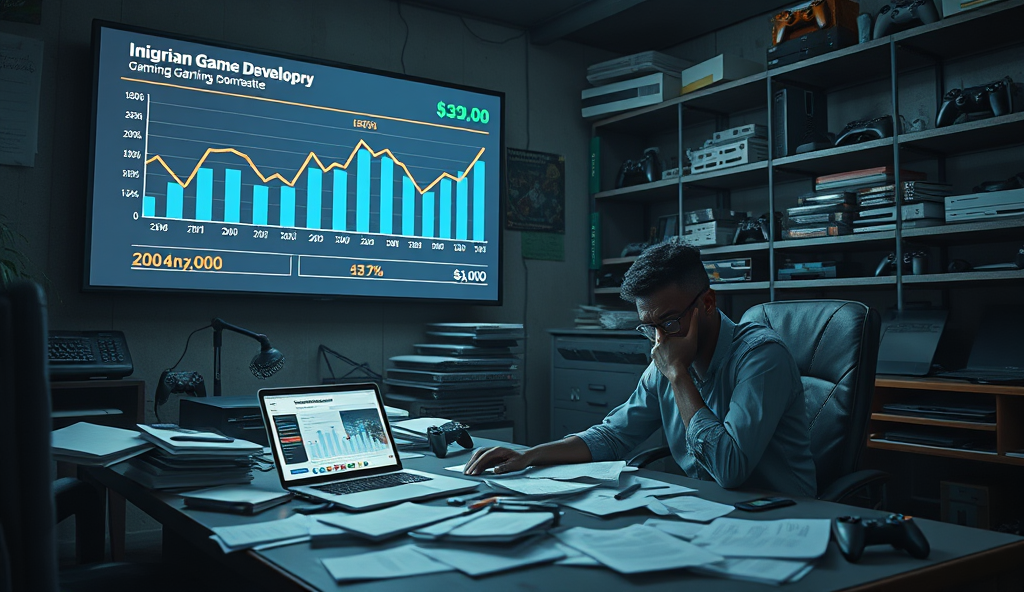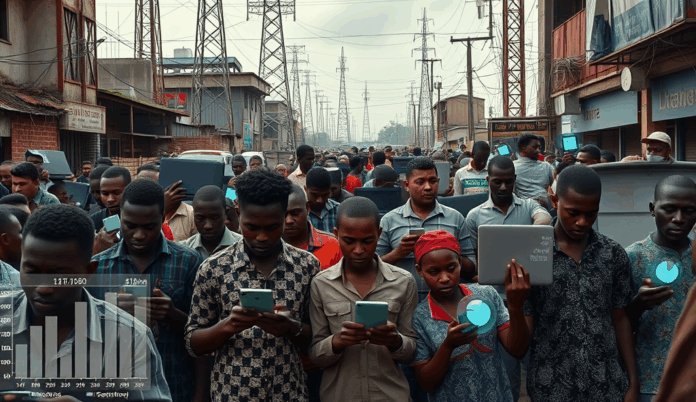Introduction to the Gaming Industry Growth in Nigeria
Nigeria’s gaming industry has surged by 25% annually since 2020, fueled by smartphone penetration reaching 50% among young adults. Local startups like Maliyo Games and Kuluya have capitalized on this growth, developing hyper-casual mobile titles tailored for Nigerian audiences.
The rise of esports in Nigeria has further accelerated market expansion, with tournaments like the African Esports Championship attracting over 10,000 participants nationwide. Tech hubs across Lagos and Abuja now incubate gaming startups, creating jobs for young developers and content creators.
This rapid evolution sets the stage for examining the current state of Nigeria’s gaming ecosystem, where mobile gaming trends and youth engagement continue reshaping entertainment consumption patterns. Government policies and investment opportunities are emerging as key drivers for sustained growth in this dynamic sector.
Key Statistics

Current State of the Gaming Industry in Nigeria
Nigeria's gaming market now generates over $200 million annually with mobile gaming dominating 70% of revenue as affordable smartphones enable wider access.
Nigeria’s gaming market now generates over $200 million annually, with mobile gaming dominating 70% of revenue as affordable smartphones enable wider access. Local developers are creating culturally relevant content, such as Maliyo Games’ “Afro Brawl,” which blends traditional folklore with modern gameplay mechanics.
Esports tournaments now attract corporate sponsors like MTN and Pepsi, signaling mainstream acceptance of competitive gaming as a viable entertainment sector. Lagos-based hubs like NG_Hub and Co-Creation Hub host regular gaming hackathons, fostering innovation among young Nigerian developers.
This thriving ecosystem faces infrastructure challenges, including unreliable electricity and internet connectivity, which hinder consistent growth. However, increasing youth engagement and government initiatives like the National Digital Economy Policy present opportunities for sustainable expansion.
Factors Driving the Growth of Gaming Among Young Adults
The rise of affordable smartphones now owned by 40% of Nigeria’s population has democratized access to mobile gaming fueling its 70% revenue dominance in the market.
The rise of affordable smartphones, now owned by 40% of Nigeria’s population, has democratized access to mobile gaming, fueling its 70% revenue dominance in the market. Local developers like Maliyo Games capitalize on this by creating culturally resonant titles such as “Afro Brawl,” which merges traditional folklore with engaging gameplay to attract young adults.
Corporate sponsorships from brands like MTN and Pepsi have legitimized esports as a career path, with tournaments offering prize pools exceeding $50,000, incentivizing youth participation. Tech hubs like NG_Hub further nurture talent through hackathons, bridging the gap between gaming passion and professional opportunities.
Government initiatives, including the National Digital Economy Policy, aim to address infrastructure gaps while fostering innovation, creating a more stable environment for gaming startups. Despite electricity and internet challenges, Nigeria’s youthful population (60% under 25) continues to drive demand, positioning gaming as a mainstream entertainment and economic force.
Popular Gaming Platforms and Trends in Nigeria
Mobile gaming has democratized access to gaming in Nigeria with affordable smartphones and low-data games like Ludo King enabling 65% of young adults to play daily.
Mobile gaming dominates Nigeria’s gaming landscape, with platforms like Google Play Store and App Store accounting for 85% of downloads, while locally developed games like Maliyo’s “Afro Brawl” gain traction by blending folklore with competitive gameplay. Esports platforms such as Gamr and Naija Esports League are rising, hosting tournaments backed by MTN and Pepsi, attracting over 10,000 monthly participants.
Battle royale and hyper-casual games lead trends, with titles like “Free Fire” and “Ludo King” particularly popular among Nigeria’s youth due to low data consumption and social features. Local developers are also experimenting with blockchain gaming, leveraging Nigeria’s crypto-savvy population to create play-to-earn opportunities.
The shift toward cloud gaming is emerging, with services like GeForce Now gaining interest despite infrastructure challenges, signaling potential growth as internet stability improves. This evolution sets the stage for deeper exploration of mobile gaming’s transformative impact on Nigeria’s industry.
Impact of Mobile Gaming on the Industry
Despite infrastructure challenges Nigeria’s gaming industry offers diverse career paths from esports coaching to game development in Lagos tech hubs like CcHub.
Mobile gaming has democratized access to gaming in Nigeria, with affordable smartphones and low-data games like “Ludo King” enabling 65% of young adults to play daily, according to a 2023 report by SB Morgen. This surge has spurred local developers like Maliyo Games to create culturally relevant titles, tapping into Nigeria’s $250 million mobile gaming market.
The rise of mobile gaming has also fueled ancillary industries, with payment platforms like Flutterwave integrating gaming microtransactions and content creators monetizing gameplay streams. MTN’s sponsorship of mobile esports tournaments highlights how telecom giants are capitalizing on this growth, creating new revenue streams.
As mobile gaming continues to reshape Nigeria’s digital economy, its influence is spilling over into esports, setting the stage for competitive gaming’s expansion. This transition underscores how mobile platforms are becoming the backbone of Nigeria’s gaming ecosystem.
Role of Esports in the Nigerian Gaming Scene
Nigeria’s gaming industry is projected to grow at 12% annually reaching $250 million by 2027 driven by mobile gaming trends and youth engagement.
Building on mobile gaming’s explosive growth, esports has emerged as a key driver of Nigeria’s gaming ecosystem, with tournaments like the MTN Gaming Championship attracting over 50,000 participants in 2023. Local organizations like Naija Esports Federation are nurturing talent through structured leagues, mirroring global competitive gaming trends while adapting to Nigeria’s mobile-first reality.
Prize pools have surged, with events like the African Esports Championship offering $100,000, incentivizing youth to pursue professional gaming careers. Platforms like YouTube and Twitch amplify this growth, as Nigerian streamers like “Pablo Escobar” monetize gameplay to audiences exceeding 200,000 subscribers, blending entertainment with competitive play.
Despite this momentum, infrastructure gaps persist—a challenge that underscores the need for investment as esports transitions from casual mobile play to professionalized competition. These hurdles set the stage for examining broader industry obstacles in the next section.
Challenges Facing the Gaming Industry in Nigeria
Despite the rise of esports in Nigeria and mobile gaming’s popularity, limited internet penetration—only 40% as of 2023—hinders widespread participation, particularly in rural areas. High data costs further exclude potential gamers, with 1GB averaging ₦500, making competitive online play financially inaccessible for many.
Local game development faces funding shortages, as less than 10% of Nigerian gaming startups secure venture capital, stifling innovation in a market dominated by foreign titles. Additionally, unreliable electricity forces gamers to rely on generators, adding up to ₦20,000 monthly in fuel costs for serious competitors.
While platforms like Twitch enable monetization, inconsistent payment gateways and banking restrictions complicate revenue streams for creators like “Pablo Escobar,” highlighting systemic barriers. These challenges, however, create untapped opportunities for solutions, setting the stage for exploring career pathways in the next section.
Opportunities for Young Adults in the Gaming Sector
Despite infrastructure challenges, Nigeria’s gaming industry offers diverse career paths, from esports coaching to game development in Lagos tech hubs like CcHub. With mobile gaming trends in Nigeria growing 25% annually, content creators like “Pablo Escobar” demonstrate how monetization through platforms like TikTok Gaming can offset data costs.
Local game development startups like Maliyo Games prove Nigerian talent can compete globally, with over 500,000 downloads for their Africa-themed titles. Youth engagement in Nigerian gaming also thrives through tournaments like the Gamr Africa League, where winners earn up to ₦5 million in prizes.
These opportunities highlight the sector’s potential, though systemic barriers remain—setting the stage for discussing how government and private sector support could accelerate growth.
Government and Private Sector Support for Gaming
Recognizing the gaming industry’s potential, Nigeria’s government has begun implementing policies like the National Digital Economy Policy, which includes provisions for tech startups, including game developers. Private investors are also stepping in, with firms like Ventures Platform funding gaming startups such as Maliyo Games, bridging gaps in infrastructure and funding.
Initiatives like the Lagos State Employment Trust Fund (LSETF) have provided grants to gaming entrepreneurs, while corporate sponsorships from brands like MTN and Pepsi fuel esports tournaments. These collaborations demonstrate how public-private partnerships can accelerate the rise of esports in Nigeria, creating sustainable ecosystems for youth engagement.
With mobile gaming trends in Nigeria surging, telecom companies like Glo and Airtel now offer affordable data plans tailored for gamers. Such targeted support, combined with tech hubs like CcHub’s incubation programs, sets a foundation for future projections of industry expansion.
Future Projections for the Gaming Industry in Nigeria
Building on current momentum, Nigeria’s gaming industry is projected to grow at 12% annually, reaching $250 million by 2027, driven by mobile gaming trends and youth engagement. Local studios like Maliyo Games and Kuluya are expanding their portfolios, while esports tournaments sponsored by MTN attract over 50,000 participants yearly, signaling untapped potential.
With tech hubs like CcHub nurturing talent and telecoms offering gamer-friendly data plans, Nigeria could become Africa’s leading gaming market by 2030. Government policies, such as tax incentives for startups, combined with private investments, will likely accelerate this growth, creating over 50,000 jobs in game development and content creation.
The rise of esports in Nigeria, supported by corporate sponsorships and grassroots initiatives, positions the country as a regional hub for competitive gaming. As infrastructure improves and local developers gain global recognition, the industry’s expansion could contribute significantly to Nigeria’s digital economy, setting the stage for broader tech innovation.
Conclusion on the Growth of Gaming in Nigeria
Nigeria’s gaming industry has shown remarkable resilience, with mobile gaming trends in Nigeria driving a 25% annual growth rate as young adults embrace affordable smartphone entertainment. Local game development studios like Maliyo Games and ChopUp are proving that homegrown content can compete globally while addressing cultural relevance.
The rise of esports in Nigeria, supported by tech hubs like Co-Creation Hub, highlights how infrastructure and community are fueling professional opportunities. With gaming startups flourishing in Nigeria and investment opportunities growing, the sector is poised to become a major economic contributor.
Government policies affecting gaming in Nigeria must evolve to support this momentum, ensuring sustainable growth for youth engagement and content creation. As the industry expands, collaboration between developers, investors, and regulators will determine its long-term success.
Frequently Asked Questions
How can I start a career in Nigeria's gaming industry without formal training?
Join gaming communities like Naija Game Dev on Facebook and participate in free online courses from platforms like Udemy to build skills.
What are the best mobile games developed by Nigerian studios to support local talent?
Try Maliyo Games' Afro Brawl or ChopUp's BattleTrucks—both showcase Nigerian themes and are available on Google Play.
Can I monetize gaming content in Nigeria despite payment challenges?
Yes! Use Paystack for local transactions and focus on platforms like YouTube Gaming which offer smoother payout options.
How can I participate in esports tournaments in Nigeria with limited internet access?
Look for offline qualifiers hosted by Gamr Africa or Naija Esports League and use MTN's gaming data bundles for affordable practice.
What tools do Nigerian game developers use to create mobile games efficiently?
Unity and Godot are popular free engines—CcHub Lagos offers workshops to master them for hyper-casual game development.


